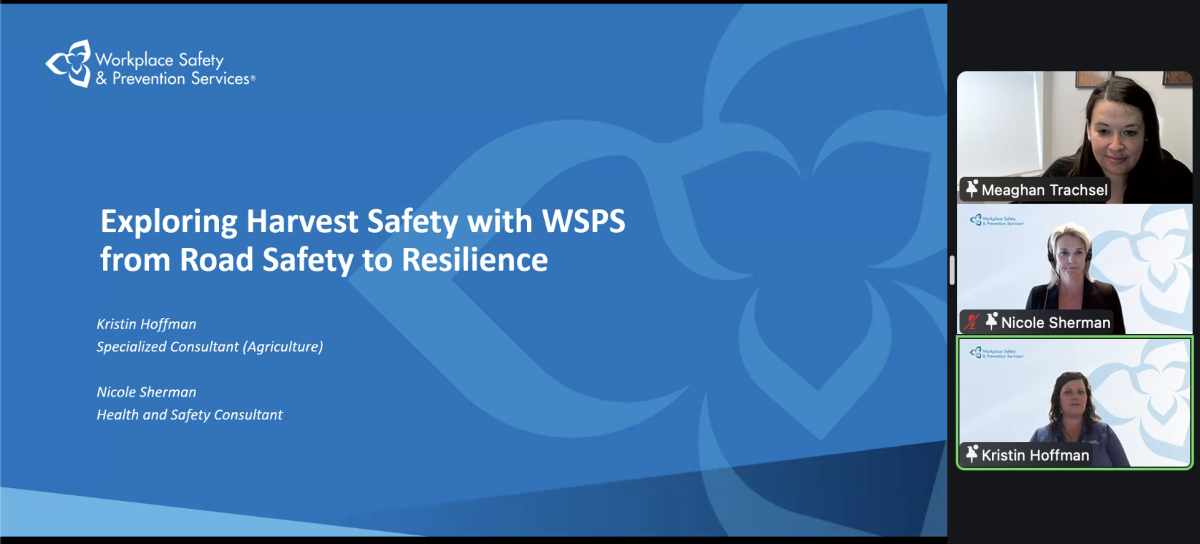It’s got no new nuggets specifically for crop or livestock producers, but Tuesday’s federal budget includes the end results of last year’s consultations — and backlash — on corporate taxation.
Finance Minister Bill Morneau’s 2018 budget proposes a couple of new limits on Canadian-controlled private corporations’ (CCPC) ability to benefit from a lower tax rate on passive investment income.
Morneau last July had proposed that savings — if held as passive investments within CCPCs — would be “taxed in a manner that is equivalent to savings held directly by individuals.”
Read Also

Exploring Harvest Safety
Kristin Hoffman of WSPS explains measures for increased farm safety around harvest season
Farm groups such as the Canadian Federation of Agriculture (CFA) objected at the time, describing passive investments as “vital” to farmers in managing year-over-year risks due to weather or market volatility.
Due to such concerns raised during public consultations last summer, Morneau stepped back from that proposal last fall.
As Tuesday’s budget noted, tax experts in last year’s consultations suggested the main reason for the use of private corporations as a tax planning tool was “the significant difference between personal tax rates and the low small business tax rate.”
Thus the new budget proposes that if a corporation earns over $50,000 of passive investment income in a given year, the amount of income eligible for the small business tax rate will be “gradually reduced.”
The small business deduction limit would be reduced by $5 for every $1 of investment income above the $50,000 threshold, cutting the business limit to zero at $150,000 of investment income.
The budget’s proposal marks “an important departure” from last July’s proposal, the government said, in that the budget plan doesn’t directly affect taxes on passive investment income. Also, no existing savings will face any additional tax on withdrawal.
Tuesday’s budget also proposes that CCPCs will no longer be able to get refunds of taxes paid on investment income while distributing dividends from income taxed at the general corporate rate. Refunds will continue to be available when investment income is paid out.
Until now, any taxable dividends a private corporation pays out could trigger a refund of taxes paid on investment income, regardless of where the dividend came from.
Both measures, the government said, will apply in taxation years that begin after 2018. The two measures, along with new rules on income sprinkling, are expected to raise $925 million per year for the government by 2022-23.
Tuesday’s budget documents emphasized that for a farm operating as a CCPC, investment income from the AgriInvest program — which includes matching government contributions — is not considered passive income and won’t be affected by the new rules.
The budget proposals on passive investments are targeted, the government said, to affect less than three per cent of CCPCs, or about 50,000 private corporations.
CFA president Ron Bonnett, in a separate release Tuesday, said the farm organization “is pleased that changes regarding passive investment incomes have been further clarified. However, more time is needed to review the legislation with more scrutiny.”
Budget expenses
The budget doesn’t include any specific additional measures for the federal agriculture department, holding its program expenses at $2.4 billion for 2018.
Noting “few mentions” of agriculture in Morneau’s budget speech and documents, Bonnett said Tuesday the CFA is “disappointed that the government hasn’t directly followed up on the vision from last year’s budget, which set ambitious targets to grow the industry for the benefit of all Canadians.”
However, Bonnett said, the budget’s “continued focus on research and innovation” is positive.
On the research front, the budget announced phase one of “an ambitious plan to renew federal laboratories,” offering up $2.8 billion over five years, starting in 2018–19, for constriction of “multi‐purpose, collaborative, federal science and technology facilities.”
Specifically, the government said, “rather than work in silos, this new approach to federal science and discovery will look to bring together federal scientists and science facilities across government including Agriculture and Agri-Food Canada, Natural Resources Canada, Fisheries and Oceans Canada, Environment and Climate Change Canada, the National Research Council and others.”
The budget also sets aside $100 million over five years for the Strategic Innovation Fund with a “particular focus on supporting projects that relate to (low Earth orbit, or LEO) satellites and next-generation rural broadband.”
LEO satellites, the government said, “can receive and transmit data with significantly improved response times” and help provide internet services across “challenging landscapes” at lower costs than fibre-optic lines.
Tuesday’s budget also commits $4.3 million over five years, starting in 2018–19, to “support the reopening” of penitentiary farms at the Joyceville and Collins Bay Institutions at Kingston, Ont.
The farms are to be run by Corcan, a rehabilitation programming agency of the Correctional Service of Canada (CSC).
The government in mid-2016 announced a feasibility study on reopening the Kingston farms, which the previous Conservative government had wound down in 2009. An advisory panel, including four eastern Ontario farmers, was set up last spring to further explore the idea of reopening farms at the sites.
The budget on Tuesday also pledged $194.1 million over five years toward a “robust compliance regime” to protect and enforce rights for temporary foreign workers (TFWs) in Canada, including unannounced inspections and “ongoing collection of labour market information related to open work permits.”
The budget further proposes $3.4 million over two years for a pilot program developing a “network of support organizations” for TFWs dealing with “potential abuse by their employers.” — AGCanada.com Network















